实验5
#include <stdio.h> #define N 5 void output(int x[], int n); int main() { int x[N] = {9, 55, 30, 27, 22}; int i; int k; int t; printf("original array:\n"); output(x, N); k = 0; for(i=1; i<N; ++i) if(x[i] > x[k]) k = i; if(k != N-1) { t = x[N-1]; x[N-1] = x[k]; x[k] = t; } printf("after swapped:\n"); output(x, N); return 0; } void output(int x[], int n) { int i; for(i=0; i<n; ++i) printf("%d ", x[i]); printf("\n"); }
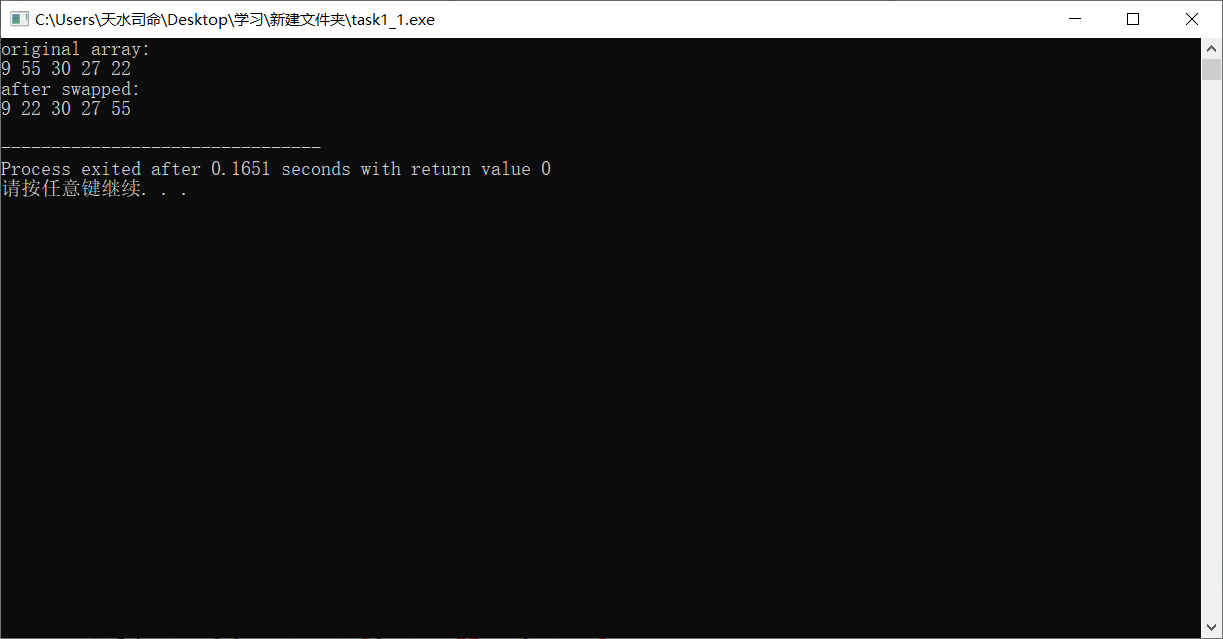
#include <stdio.h> #define N 5 void output(int x[], int n); int main() { int x[N] = {9, 55, 30, 27, 22}; int i; int t; printf("original array:\n"); output(x, N); for(i=0; i<N-1; ++i) if(x[i] > x[i+1]) { t = x[i]; x[i] = x[i+1]; x[i+1] = t; } printf("after swapped:\n"); output(x, N); return 0; } void output(int x[], int n) { int i; for(i=0; i<n; ++i) printf("%d ", x[i]); printf("\n"); }
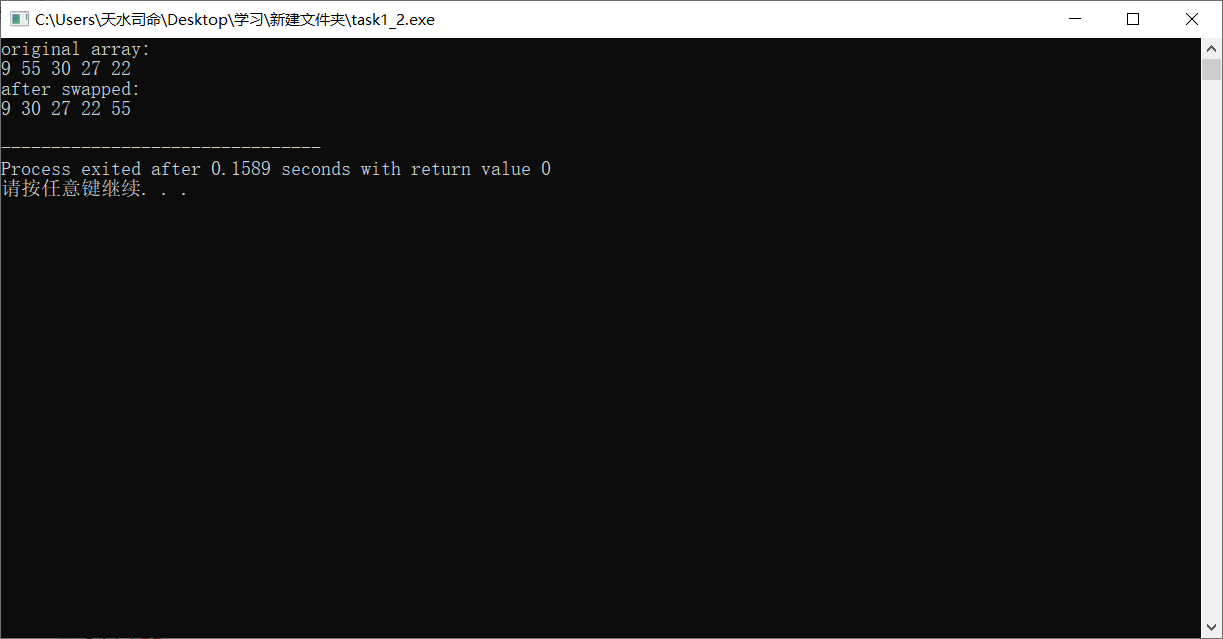
1.1一次,1.2两次。
1.1找出数组中最大的数并与最后一个数交换
1.2冒泡排序
#include <stdio.h> #define N 5 int binarySearch(int x[], int n, int item); int main() { int a[N] = {2, 7, 19, 45, 66}; int i, index, key; printf("数组a中的数据:\n"); for (i = 0; i < N; i++) printf("%d ", a[i]); printf("\n"); printf("输入待查找的数据项: "); scanf("%d", &key); index=binarySearch(a,N,key); if (index >= 0) printf("%d 在数组中,下标为%d\n", key, index); else printf("%d 不在数组中\n", key); return 0; } int binarySearch(int x[], int n, int item) { int low, high, mid; low = 0; high = n - 1; while (low <= high) { mid = (low + high) / 2; if (x[mid]==item) return mid; else if (item<x[mid]) high = mid - 1; else low = mid + 1; } return -1; }
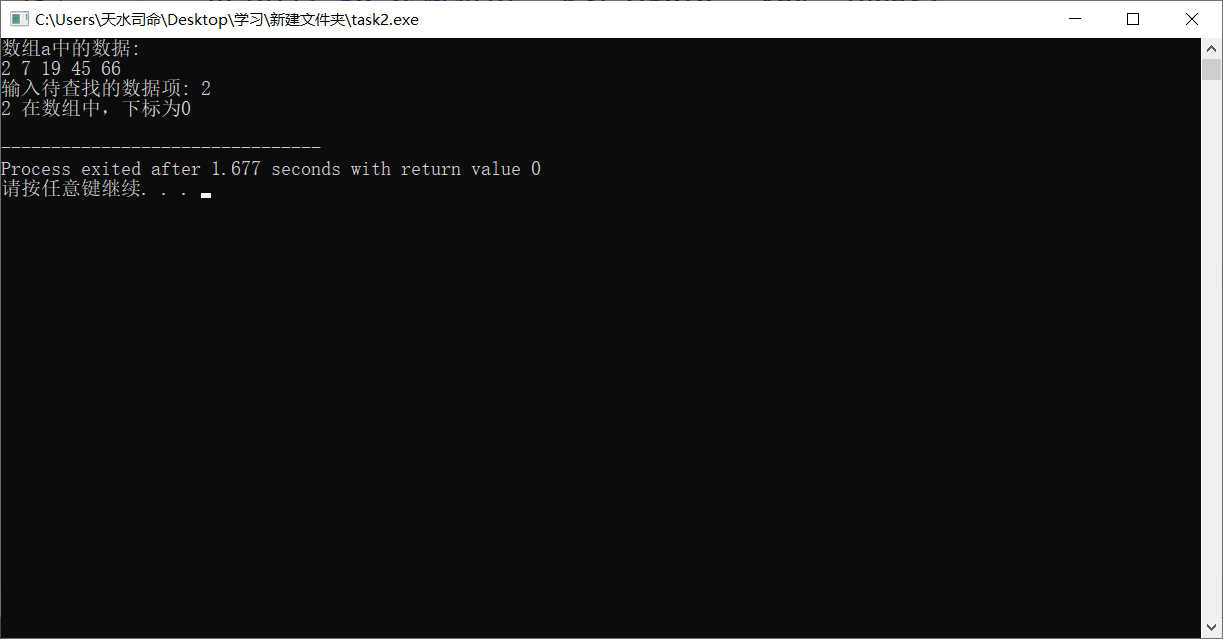
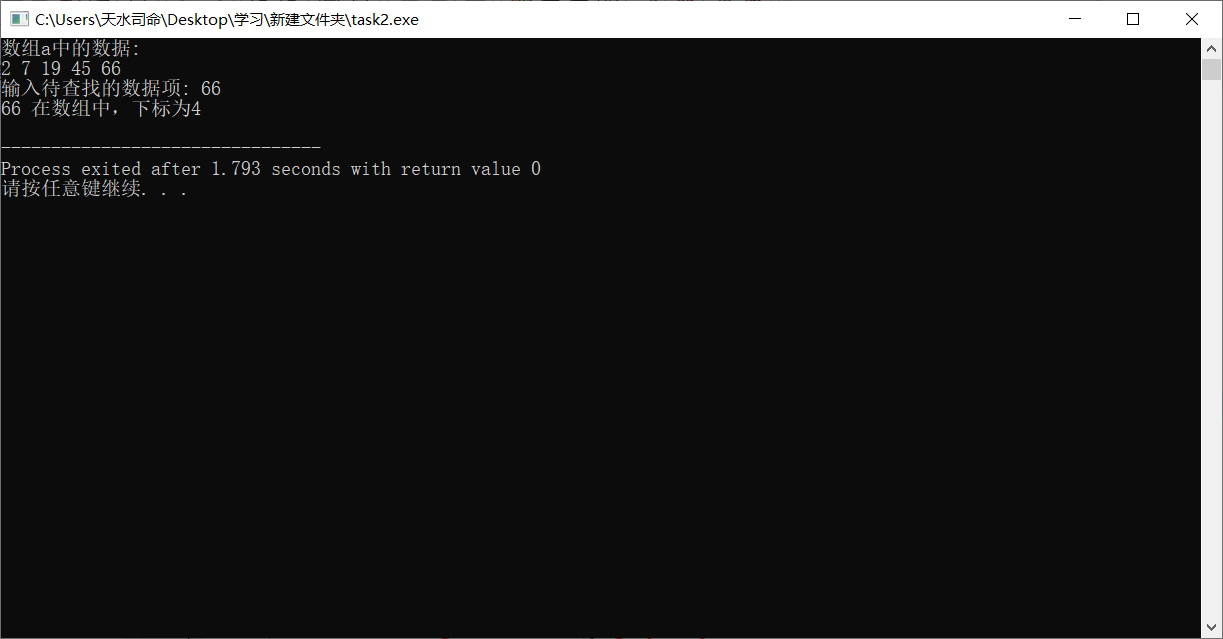

// 练习:使用选择排序算法对字符串按字典序排序 #include <stdio.h> #include<string.h> #define N 5 void selectSort(char str[][20], int n); // 函数声明,两维数组作为函数参数 int main() { char name[][20] = {"Bob", "Bill", "Joseph", "Taylor", "George"}; int i; printf("输出初始名单:\n"); for (i = 0; i < N; i++) printf("%s\n", name[i]); selectSort(name, N); // 调用选择法对name数组中的字符串排序 printf("按字典序输出名单:\n"); for (i = 0; i < N; i++) printf("%s\n", name[i]); return 0; } // 函数定义 // 函数功能描述:使用选择法对二维数组str中的n个字符串按字典序排序 void selectSort(char str[][20], int n) { int i, j, k; char a[100][100]; for (i = 0; i < n - 1; i++) { k = i; for (j = i + 1; j < n; j++) if (strcmp(str[j], str[k]) < 0) k = j; if (k != i) { strcpy( a[i] ,str[i]); strcpy(str[i] ,str[k]); strcpy(str[k], a[i]); } } }
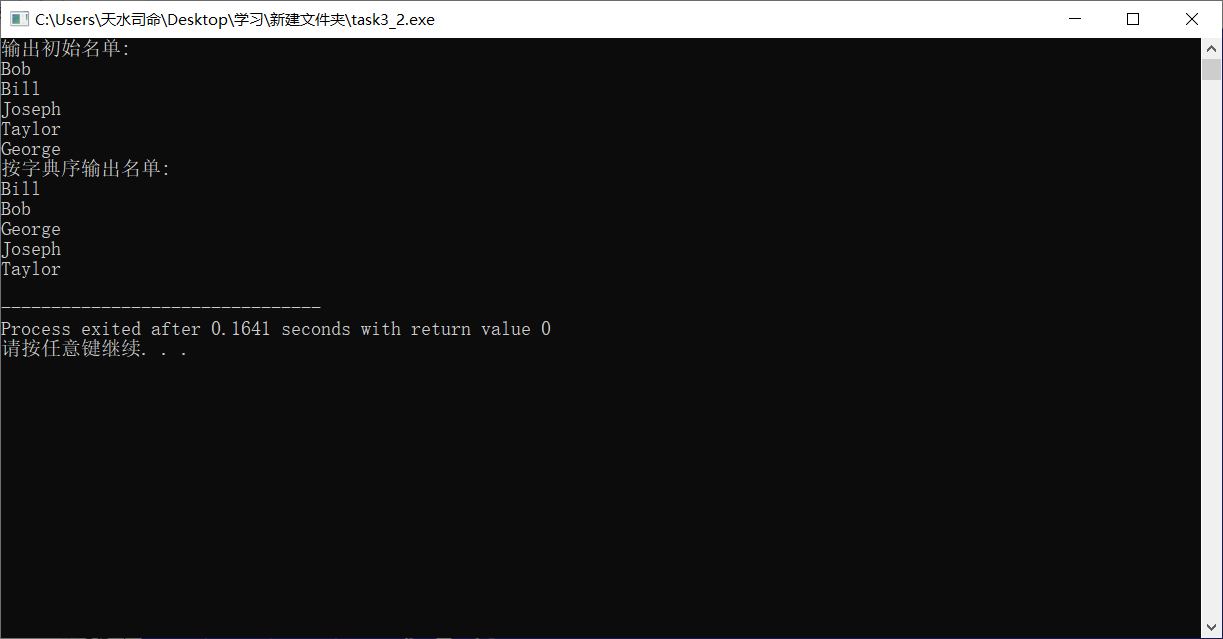
#include <stdio.h> int main() { int n; int *pn; n = 42; pn = &n; printf("%#x: %d\n", &n, n); printf("%#x: %#x\n", &pn, pn); printf("%d\n", *pn); return 0; }
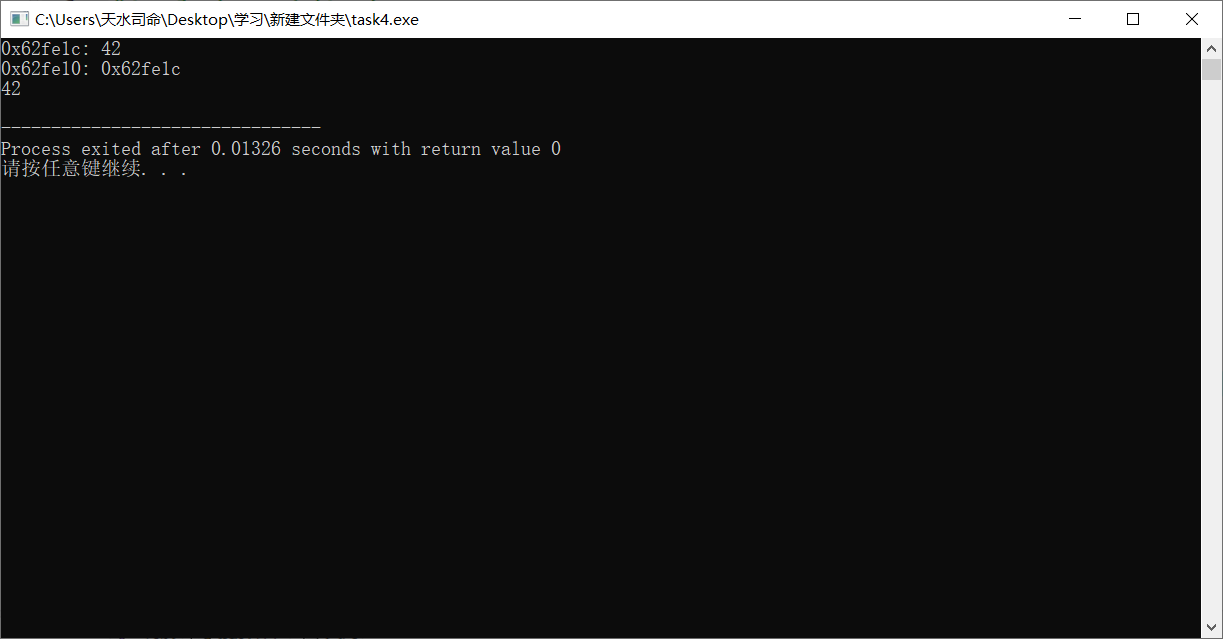
0x62fe1c 42
0x62fe10 0x62fe1c
变量n
#include <stdio.h> #define N 5 int main() { int a[N] = {1, 9, 2, 0, 7}; int i; int *p; for(i=0; i<N; ++i) printf("&a[%d] = %#x, a[%d] = %d\n", i, &a[i], i, a[i]); printf("\n"); for(i=0; i<N; ++i) printf("a+%d = %#x, *(a+%d) = %d\n", i, a+i, i, *(a+i)); printf("\n"); p = a; for(i=0; i<N; ++i) printf("p+%d = %#x, *(p+%d) = %d\n", i, p+i, i, *(p+i)); return 0; }
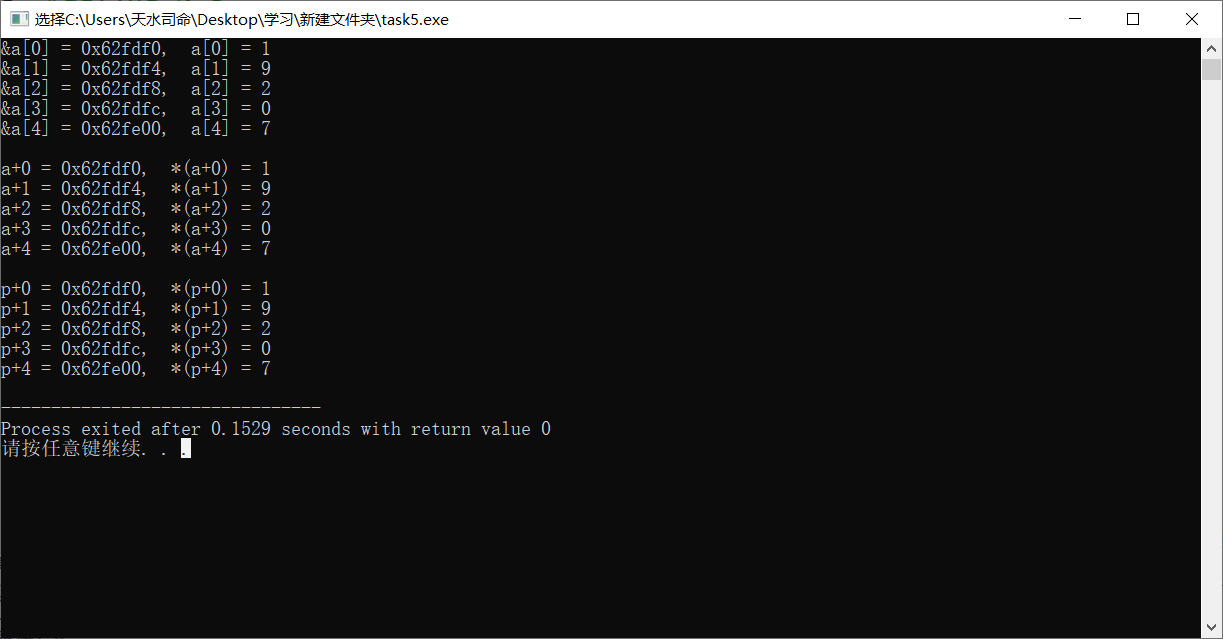
可,可。



 浙公网安备 33010602011771号
浙公网安备 33010602011771号